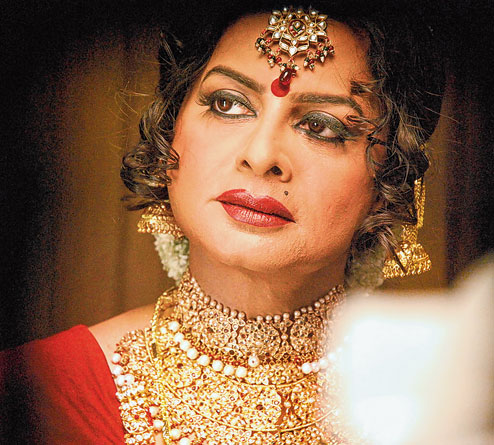 |
| Rituparno Ghosh in Aarekti Premer Galpo |
So what do you do when you hear news of the sudden death of someone close to you? People cry, shriek or mourn in silence but here we were four friends whose lives Ritu da has touched in various ways sitting around wanting to talk about how he had left us in the lurch without completing the dialogue he had initiated. And through our conversations the reference to Ritu da’s gender became fluid and constantly changing between ‘him’ and ‘her’ ; it was as fluid as ‘he’ wanted ‘her’ sexuality to remain either in films or in real life.
We decided to eat some sweets and have an adda, because that’s what he liked to do with us around.
My earliest memories of Ritu da were that of Hirer Angti and then Unishe April but it was only through films at that point of time. Then it was one of those game-changing controversial episodes of Ghosh and Company in conversation with Mir (on TV) that I realised who he truly was. I was totally mesmerised by his capabilities of confronting Mir on his mimicking of an effeminate Rituparno Ghosh. That episode for the very first time brought into the homes of middle-class Bengali households the issues of sexuality and beyond, for the very first time he confronted someone and made a point. The lines from that episode still ring in my ears: “Mir, your mimicry is not that benign, it does not mimic the intellect of Rituparno Ghosh, rather it mimics an effeminate man, and each time your voice sounds on those radio waves around Bengal, thousands of effeminate men like me will cringe and feel ashamed of themselves.”
That was the arrival of a subtle activist in Ritu da and till date that recorded episode is shown by a lot of community activists around the state to bolster courage among men trying to deal with their own sexuality. A deep respect was born for him which in later days bloomed into something more meaningful.
Our personal association began a few years ago with a phone call from Ritu da with him wanting to discuss the now famous film called Aarekti Premer Galpo, for which he wanted to source costumes.
Filled with nervous expectations we met The Rituparno Ghosh at our studio and ended up spending hours together discussing fashion, films, literature and above all his favourite, Tagore. And then she came with no entourage, just herself and head full of the story of the film and I still remember it was three hours of hypnotic story-telling capabilities which kept us glued to our seats. As she ended the session I realised this is one film which would change a lot of perceptions about Ritu da and her introduction as an actor, but most importantly this film would for the very first time address the issues of sexuality as directly as possible.
The LGBT community at large post-Aarekti Premer Galpo and Memories in March was still not sure what was her personal point of view until Chitrangada happened. Everyone in the community was waiting with bated breath and, yes, it did create a lot of debate and its fair share of controversy. But most importantly, all of a sudden, the middle-class Bengali was talking about sexuality in the drawing room and at the dinner table.
I finally realised that Chitrangada was Ritu da’s coming-of-age film and even his coming-out film, for which he invited us personally for the premiere. We left midway through the film and later on I frankly sent her an SMS and told him how I felt. He promptly invited me over to discuss what I didn’t like about the film. In all his sporting ways, he did accept what I said though I was sure it hurt him deeply but that was the greatness of who he was.
To this date a person’s arrival at a social gathering wearing flamboyant androgynous clothes would raise such eyebrows, specially among middle-class Bengalis — their usual comments were “he is so talented but why does he have to dress up like that?” — but slowly and surely she did make a mark of what she was all about, what she wanted to be — fluid — and how she wanted to lead her life on her own terms.
And it was on her own terms that she left like a Queen, now mourned by thousands around city, state, country and the world.
As she leaves the four of us sitting around the table, we have come to realise that very few people have had the courage and conviction to do what they believe in and to live on their own terms and style. But what we fail to understand is why it always takes grief to make us realise how important she was in our lives and for the future generations to come.
The community at large would feel the vacuum of who would come to give a voice to their stories, who would take them through journeys of the fantasy yet real world of ‘Rituparno Ghosh Movies’, and who would be the one taking them back to the movie theatres over and over again. Who would raise the questions of where sexuality ends and love merges?
As for the four of us, we couldn’t control our tears for the Ritu da who we will dearly miss and who will never be a part of our addas again…but her mysterious ways will always remain in the many characters she created in her films.
PS: Just like the way you used to send me SMSes in the early hours of the morning, today my last message going out to you would be just like yours: “ador”.










